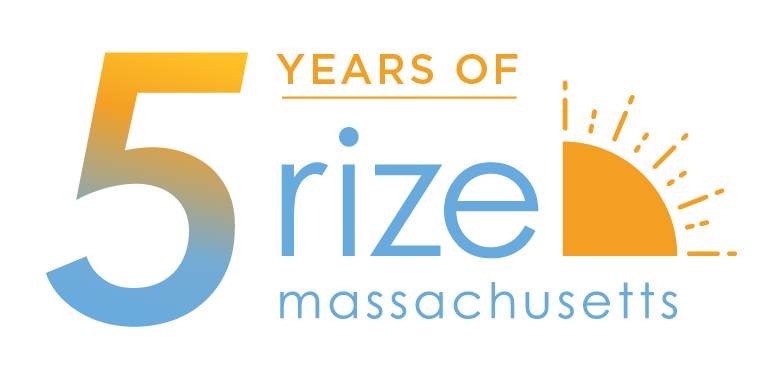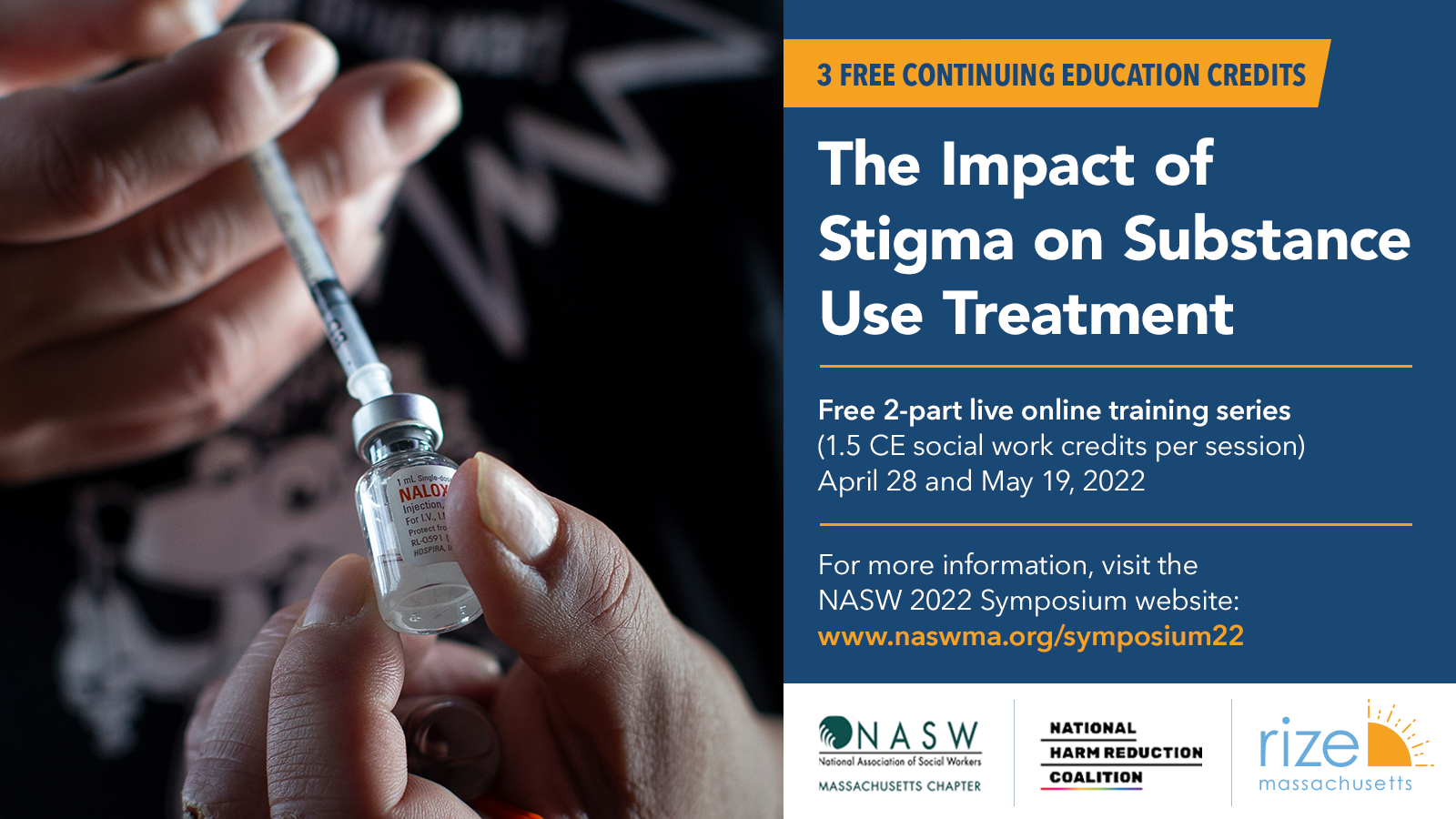5 Years of RIZE
Because Every Life is Worth Saving
Introduction
Over the past five years, Massachusetts has lost over 2,000 lives annually to overdose. This crisis is not limited to a single demographic, location, or industry. Overdose happens in every town and every community in the Commonwealth. It is ripping apart families, ruining lives, and impacting us all. And it is disproportionately impacting Hispanic and Black men who have experienced an increase in fatal overdose in recent years.
RIZE was created in 2017 to pursue an unconventional, risk-taking approach to the opioid overdose epidemic with the goal of reaching zero stigma and zero deaths. The stress and isolation of the COVID-19 pandemic has exacerbated the crisis, and yet RIZE is more committed than ever to this mission. It has been our guiding force every day as we strive to break new ground and support bold new initiatives and collaborations.
This impact report is a mile marker five years after beginning our journey as an organization. We are eager to share what we’ve learned and how that knowledge and experience is driving our efforts, and those of our community partners, forward.
We all want to solve the overdose crisis, but no one can do it alone. We must all work together to focus on the following areas if we want to put this tragic period behind us:
Recognize harm reduction is an essential tool that saves lives;
This is our call to action. This is the direction of our current and future work. Together, we can end the stigma associated with addiction and create better access so that the people suffering from this disease can get the care they need.
Together, we can end overdose death in Massachusetts.
Addiction is treatable. This patient received low-threshold, community-based care offered by Greater Lawrence Family Health Center, an important part of the continuum.
An Intractable Problem; An Urgent Solution
“RIZE’s work is so important, because every life is worth saving.”
– Joanne, RIZE Board Member and Learn To Cope, Taunton
Founded in 2017 in partnership with health care, civic, business, and labor leaders, together with those with lived experience, RIZE Massachusetts Foundation (RIZE) is the only philanthropic organization in Massachusetts solely dedicated to ending the overdose crisis.
For decades, the opioid overdose epidemic has plagued our communities, taken loved ones indiscriminately, and devastated cities and towns across Massachusetts. When RIZE was created five years ago, we faced an intractable problem in need of an urgent solution. 2021 was the deadliest year on record for fatal overdoses in large part due to the COVID-19 pandemic.
RIZE developed a roadmap to have the most impact:
Generate and disseminate knowledge to increase visibility, expand the evidence base, and inform policy. RIZE seeks to learn with the intention of sharing our findings for the betterment of the field.
Convene for action to disrupt the status quo and enable collaboration for wide scale change. RIZE drives consensus among stakeholders to ensure they are aligned on approaches to substance use disorder policies and services.
Our mission is rooted in a desire for people suffering from substance use disorders to have access to treatment and experience better quality of life and overall health. If we can achieve that, we can achieve zero stigma and zero deaths.
Patients received care at the Brockton Community Care in Reach mobile unit that provides access to addiction treatment and basic medical care.
Convening for Action
At RIZE, we are determined to upset the status quo and change the course of the overdose epidemic. With so many silos in the addiction treatment system, we use our position as a neutral convener to bring people together, share learnings, support exploration, and enable change.
Our convenings connect key stakeholders, including those who have delivered, studied, funded, and advocated for both conventional and unconventional approaches to the overdose crisis, with the goal of ending it. And always – with every topic RIZE features – the voice of those with lived experience is paramount.
Every person who has been touched by this epidemic, personally or professionally, shares our sentiment that action cannot wait. That fierce determination is what propels our work together and provides a unique window of opportunity to forge consensus and drive large scale change.
It is with this backdrop that RIZE seeks to bring diverse groups together to find common ground.
Together in Recovery
Together in Recovery Overview video
Launched in 2019, Together in Recovery (TiR) is one of the most ambitious, promising endeavors undertaken by RIZE. Comprised of a range of voices, approaches, and beliefs, the TiR team uses its diversity as its strength to promote all pathways to recovery. Members use what they’re seeing on the ground — whether in the court system or the healthcare system — to expand knowledge, understanding, and acceptance of varying approaches so individuals can access the path right for them.
Your Rights in Recovery Toolkit
One notable collaboration produced by Together in Recovery is the creation of the Your Rights in Recovery Toolkit, an expansive online resource with guidance on recovery pathways, housing, education, employment, and legal rights.
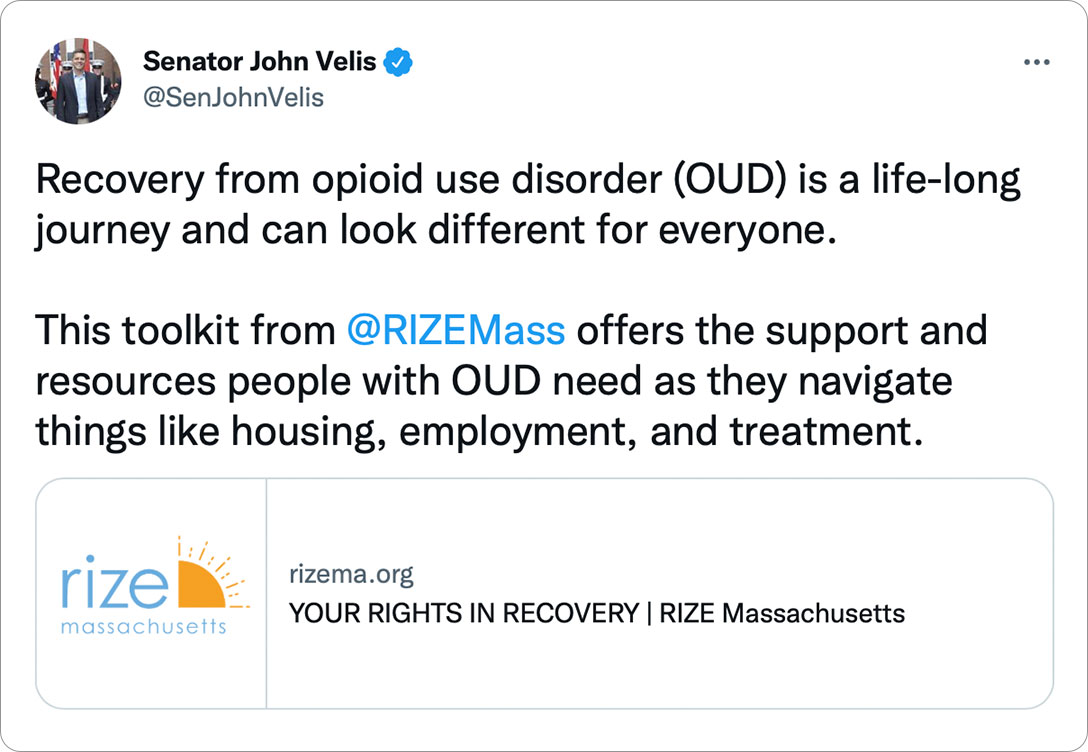
Turning Talk Into Action
Innovations in Addiction Treatment and Harm Reduction
Held in collaboration with the Kraft Center for Community Health at Massachusetts General Hospital (MGH), this webinar focused on the ingenuity and novel approaches taking place in Massachusetts in real time as we experienced a surge in overdose deaths during the COVID-19 pandemic.
Person-Centered Care Summit
This summit focused on emphasizing treatment, recovery planning, and decision making respectful of and responsive to a person’s unique circumstances, wishes, and needs. Attendees learned about the benefits of person-centered care for people with opioid use disorder and identified steps to implement it in their own organization.
Panelists participated in “Polysubstance Use – 4th Wave of the Opioid Crisis: What does it mean for Massachusetts?” where they shared learnings about the ever changing landscape.
Building the Evidence Base: Generating and Disseminating Knowledge
“The more informed people are about what they’re using, the better chance they have of surviving.”
– Kelly, Brockton Neighborhood Health Center
The overdose epidemic has evolved over the years, and so too have opinions and policy positions. RIZE uses its platform and leadership position to invest in forward thinking research that builds the evidence base and generates knowledge to provide direction for policymakers, addiction treatment providers, and non-profit organizations making a difference for those with opioid use disorder (OUD). RIZE is dogged in our pursuit to learn what approaches work, share our research findings, and effect change with urgency and resolve.
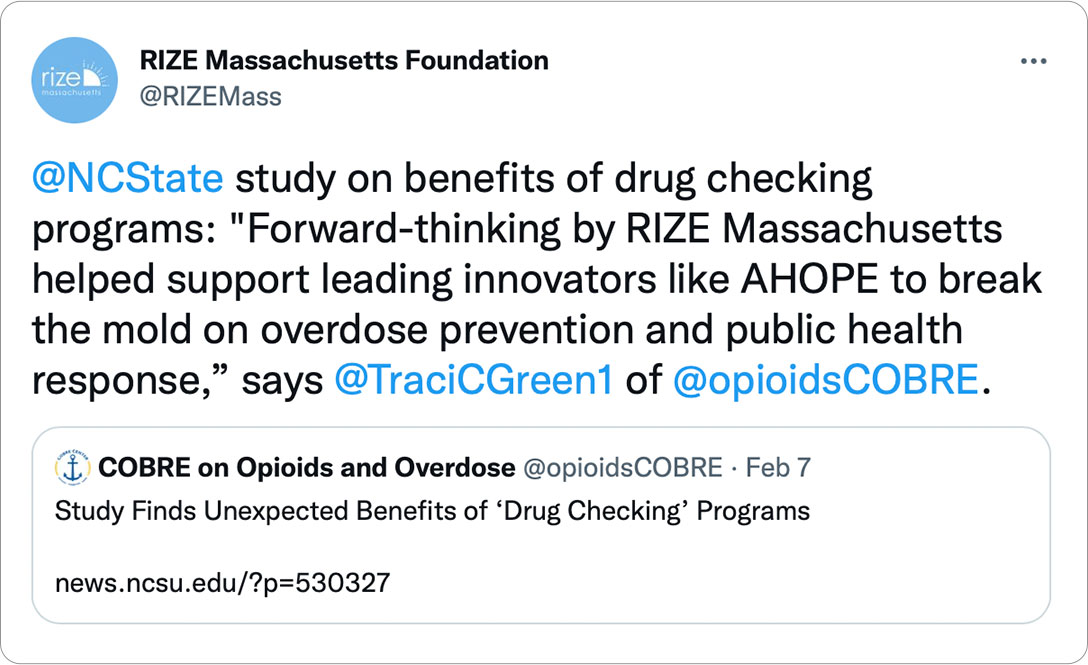
Research Examples
Opportunities to Increase Screening and Treatment of Opioid Use Disorder Among Healthcare Professionals
“It hit me that it’s very likely that many of us within the past five to 10 years have not been trained to screen for substance use disorder, to treat substance use disorder and to provide ongoing care for this medical condition. That lack of comfort caring for patients with substance use disorder struck me,” said Dr. Maryanne Bombaugh, Past President of the Massachusetts Medical Society and gynecologist at Community Health Center of Cape Cod.
The Massachusetts Opioid Epidemic – An Issue of Substance
“The opioid epidemic has reached just about every community in Massachusetts and across this country,” said Attorney General Healey. “We see it within our own families, and among friends and neighbors. This comprehensive report brings a unique look into the economic and fiscal impacts of this devastating crisis on our state and shows that while our efforts are making a difference –we have much more work to do. I look forward to working with Massachusetts Taxpayers Foundation, RIZE, and the business community to continue finding ways to address this growing public health crisis.”
Addressing the Opioid Crisis in Small and Rural Communities in Western Massachusetts
“Our community has stated loud and clear that they want a more effective, health-based approach to prevention and treatment for substance use disorder,” said Berkshire District Attorney Andrea Harrington. “We are recognizing substance use disorder as a disease and are expanding on recognized best practices for treatment. I am honored and excited to join the Mass Health Policy Forum and to collaborate on expanding access to effective treatment here in Western Massachusetts.”
Kenny and Sarah from AHOPE, Boston, a program that provides access to harm reduction services, a treatment pathway that can reduce instances of overdose.
Expanding and Bolstering the Workforce
“Harm reduction is something that we use to empower people.”
– Nashley, Bridgewater State social work graduate student and RIZE HaRT Scholar
Despite recent improvements made through legislation, policy reforms, and substantial public and private investment, the historical separation in the delivery of behavioral health and primary care services continues to create challenges for many seeking treatment. Nowhere is that separation more evident than in addiction care where most treatment options are delivered by programs that are geographically, financially, culturally, and organizationally separate from the general healthcare system.
For those experiencing substance use disorders (SUD), this makes navigating the system complex and confusing. As a result, four out of five people who need addiction treatment do not receive it according to a White House fact sheet, perpetuating their sense of despair and contributing to fatal overdoses.
If we want to increase access so more people receive the type of care they need, we must increase the number and diversity of providers while also increasing opportunities for education and training so practitioners of all types are prepared for the ever-changing landscape of the overdose crisis. In collaboration with other funders and state government, RIZE identifies needs within the addiction treatment workforce ecosystem and is laser focused on areas where we can have the most impact.
RIZE is improving the ecosystem through innovative research, programs, and community investments that build the field and drive impact on workforce and health equity without losing the essence of person-centered care.
“The harm reduction workforce is small but mighty. We do a tremendous amount of work but are often dismissed by larger systems that work with people who use drugs. Research focused on assessing and analyzing labor and pay gaps in the harm reduction workforce will help provide data to strengthen and sustain the harm reduction field.”
– Mary Wheeler Program Director, Healthy Streets Outreach Program at Health Innovations
“Access to outpatient mental health services continues to diminish. Without substantial new investment by private- and public-sectors and the implementation of bold strategies, access will further plummet and cause a system-halting workforce shortage for outpatient and acute mental health services.”
– Outpatient and Mental Health Access and Workforce Crisis, an issue brief from the Association for Behavioral Healthcare
RIZE, National Harm Reduction Coalition, and National Association of Social Workers, MA Chapter partner to educate social workers on harm reduction and stigma.
Investing in a Trained and Committed Workforce
Harm Reduction Training (HaRT) Series for Practicing Social Workers
HaRT Scholars Program
Recovery Coaches in Opioid Use Disorder Care
Pharmacists Initiative
National Medical Fellowship
Harm Reduction Workforce Needs Assessment
Finding the right clinician can be transformational. Nurses at the Greater Lawrence Family Health Center Mobile Unit meet patients where they’re at.
Reducing Racism and Increasing Access in Addiction Treatment
Alba, Andrew, Kelly, and Allyson at Brockton Neighborhood Health Center
It is tragic that five people in Massachusetts die of an overdose every day, yet those at highest risk are oftentimes the least able to access care.
Opioid use disorder (OUD) is a highly treatable illness. And just like other treatable illnesses, the quality and availability of care impacts health outcomes for patients. There is no one-size-fits-all model — approaches to treatment need to be tailored to the individual.
Decades of evidence from research studies on treatments for OUD demonstrate the effectiveness of different types of interventions. Yet, four out of five affected individuals do not receive care. This is due to a range of issues including stigma, disparities in access to care, a history of criminalizing behaviors associated with addiction, and the design of some treatment programs which may be unwelcoming to certain patient populations.
The opioid overdose epidemic has the potential to move rapidly from a health crisis to a chronic disease management model, but effective solutions must focus on both the immediate needs of those at highest risk and ensure ongoing retention in treatment.
RIZE’s vision is that our investments will produce meaningful results in addressing not just the overdose epidemic but also increasing access by improving alignment among healthcare systems, insurers, and evidence-based addiction treatment practices.
Reducing Racism in Addiction Treatment
The addiction treatment system is institutionally racist. The war on drugs and criminalization of those suffering from substance use disorders has disproportionately impacted Black and Brown people, particularly men. These communities are unfairly subjected to higher incarceration rates, decreased access to care, separation from families, and disparities in overdose fatalities. The pandemic only exacerbated these challenges, resulting in a 69% increase in opioid deaths for non-Hispanic black men in 2020 despite an overall state-wide increase of only 5% during the same period.
As an organization unafraid of risk and designed to find and fund unique and innovative interventions, RIZE set out to invest in different approaches to addressing inequity in addiction treatment.
Sarah at AHOPE, Boston
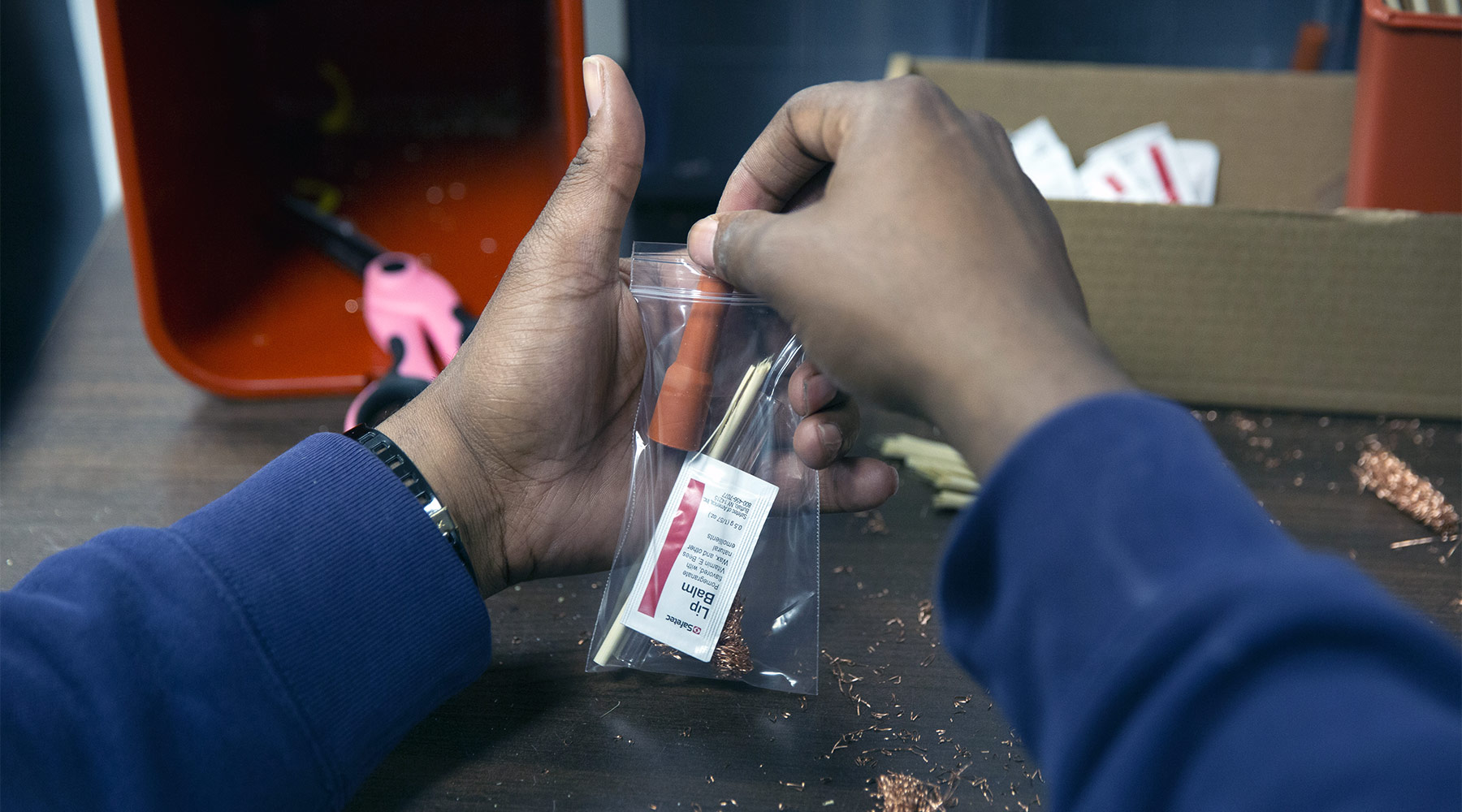
Innovations in Anti-Racism to Address the Opioid Crisis
The Innovations in Anti-Racism grant program was specially designed to improve access to addiction treatment for Black, Indigenous and people of color (BIPOC). RIZE is funding innovative programs to examine the impacts of programmatic or policy interventions on the overdose epidemic and racism as it relates to people who use drugs. Our hope is that outcome data will help identify best practices that can be scaled and replicated.
Grantees
Boston Public Health Commission
Casa Esperanza
Codman Square Health Center
Prisoners’ Legal Services of Massachusetts
Racial Disparities in Treatment Post Overdose
RIZE is funding research to examine the experiences and service-seeking behaviors of diverse Boston residents in the 30 days following an opioid overdose to understand factors that influence access to treatment and identify opportunities for system change.
Grantee
Boston Public Health Commission/ Institute for Community Health
Understanding Provider Networks
This research explored how isolated physician networks can negatively impact care coordination and information sharing among physicians. The goal was to understand the role provider networks play in perpetuating racial disparities in prescribing medications for opioid use disorder.
Grantee
Brandeis University
Saving Lives, Improving Health: Redesigning Opioid Use Disorder Care
The Saving Lives grant program improved access to low-threshold, evidence-based treatment for populations at highest risk for opioid overdose and death, with an emphasis on treatment approaches that include medication for opioid use disorder (MOUD).
Grantees
Boston Health Care for the Homeless Program
Lynn Community Health Center
Brockton Neighborhood Health Center
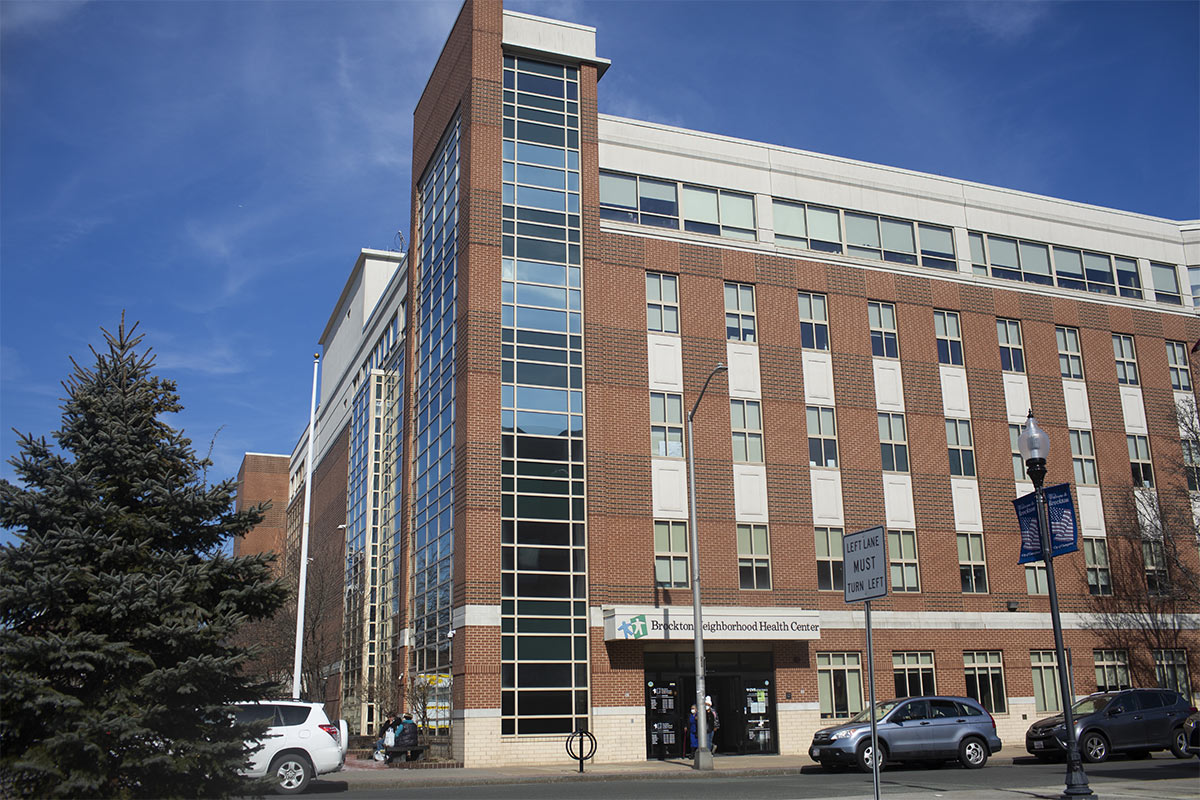
Results
%
Patients still engaged in treatment after one year
%
Engaged patients who experienced unstable housing
%
Engaged patients diagnosed with a severe mental illness (SMI)
%
Participation growth (including during COVID restrictions) over baseline
%
Increase in MOUD initiations rates during COVID
%
Increase in behavioral health engagement rates for patients with SMI
MOUD retention rates decreased over time, especially for Black patients, suggesting that retention rates should be a focus of future work, with an emphasis on racial equity.
Enabling Health: Enhancing Harm Reduction Services in Massachusetts
The Enabling Health grant program supported novel harm reduction interventions and developed stronger relationships between harm reduction services and medical care.
Grantees
AIDS Support Group of Cape Cod
Fenway Health
Greater Lawrence Family Health Center
Kraft Center for Community Health
HRH413
Life Connection Center
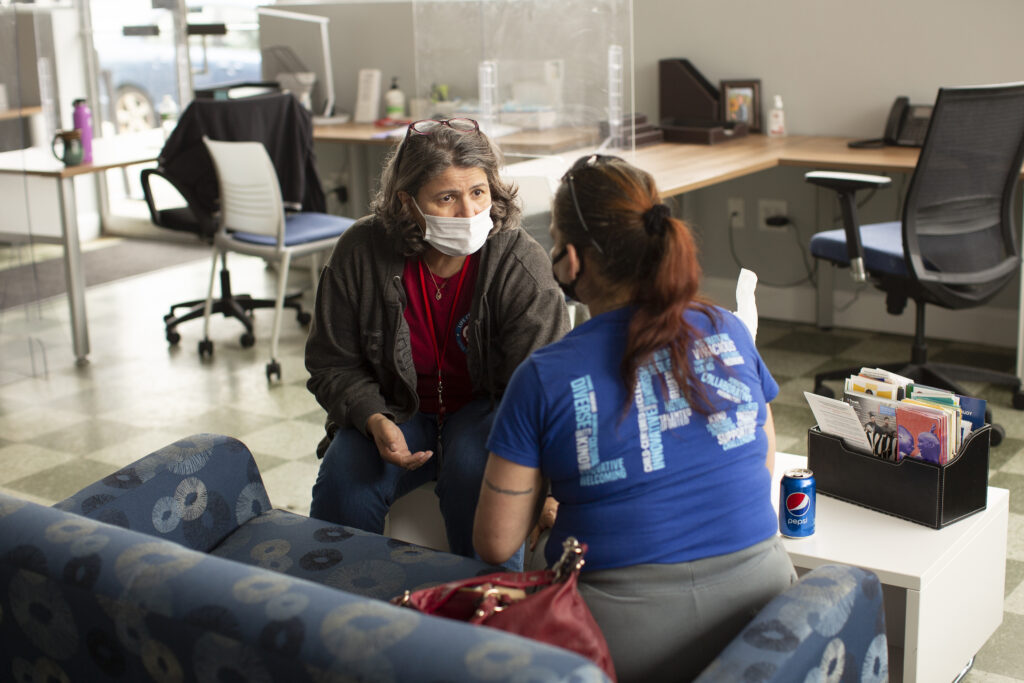
Results
People reached by grantees, an average of 463 participants per month
Total contacts
Harm reduction materials distributed
New patients linked to buprenorphine treatment
Former patients re-engaged in buprenorphine treatment
People provided care, including participants interested in medication treatment with methadone and other addiction treatment
RIZE’s COVID Response
As hospitals and clinics shifted staff and resources to address the emerging pandemic in March 2020, organizations that serve people with OUD were adversely affected as well. Frontline providers incurred unforeseen costs as they modified operations to continue providing critical services. RIZE was there to help fill immediate needs, allowing 78 of our partners to remain open and meet the unprecedented challenges of an epidemic within a pandemic.
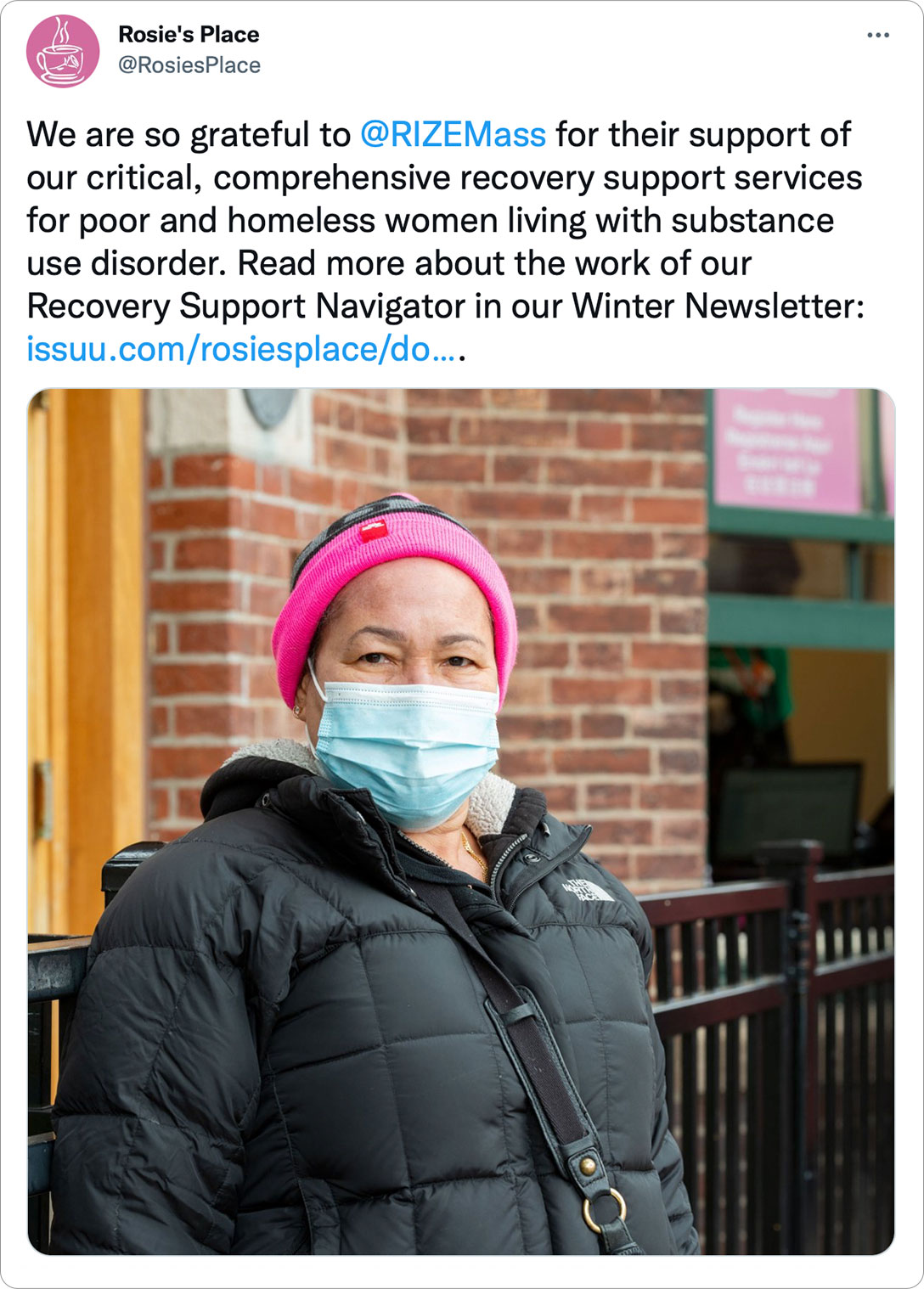
The team at Fenway Health-Green Street, Cambridge created this memorial wall to honor and remember those whose lives were taken by addiction.
Five Key Lessons Shaping Our Work
The drug overdose crisis in Massachusetts continues to evolve.
Although fentanyl is a main driver of deaths, most overdose deaths now co-occur with a non-opioid drug. Deaths involving cocaine and stimulants, such as methamphetamine, have been increasing at an alarming rate. Understanding the causes and developing solutions to increase the availability of harm reduction services and treatment for polysubstance use is a priority for RIZE.
Treatment is not one size fits all.
It should be guided by science and delivered with compassion and respect for the dignity and autonomy of the individual. Everyone should be offered immediate access to a range of treatments, including all types of medication for opioid use disorder (OUD), psychosocial interventions, and recovery supports. However, many people who need services do not receive them, in large part due to behavioral health workforce shortages. RIZE seeks to bolster the components of the behavioral health workforce needed to deliver effective care, without stigma, for all people with addiction disorders in Massachusetts.
Harm reduction is an important part of the treatment continuum.
Harm reduction focuses on keeping people who use drugs alive and as safe as possible, regardless of whether their goal is recovery. Integrating harm reduction services with low-threshold (easier) access to effective treatment can create a better, more humane approach to care. RIZE is making strategic investments that build up and support harm reduction services and make them an equal part of the treatment continuum for opioid use disorder.
Addressing the social determinants of health is key.
We must consider the other aspects of a patients life — poverty, racism, classism, social isolation, sexual exploitation, and other social inequities — in order to treat the whole patient and reduce overdose. The impact of stigma can’t be left out of the equation.-Many are quick to assume that a person with addiction can readily make behavioral choices to change their course. This is not the case. Addiction is not an issue of bad behavior; it is a chronic, treatable illness that changes the structure and function of the brain. RIZE is dedicated to understanding the root causes of addiction and eliminating the harmful impacts of stigma on people who use drugs.
People closest to the problem often have the best solutions.
People with lived experience are often the farthest away from where the decisions are made. RIZE is working to change that by including those with lived experience in our decision making, on our teams, and in our partnerships. We firmly believe in the concept “nothing about us without us.” Individuals with lived experience bring valued expertise to our work and we leverage and compensate them for their knowledge as we would with any other subject matter expert. Individuals with firsthand experience serve on our board of directors, program strategy committee, grant review committees, and lead our programmatic initiatives.
Jamie, Life Connection Center, Lowell
Rowing Together: A Call To Action
Big challenges are often best addressed by going beyond traditional or defined boundaries, by thinking outside the box, by taking a risk. We can solve seemingly unsolvable problems by gathering otherwise disconnected ideas to cross-pollinate or providing evidence for one approach over another – or many approaches together.
As we reflect on our five-year milestone, we’ve learned that working together makes us smarter and stronger – greater than the sum of our parts. RIZE proudly partners with government, providers, people with lived experience, and stakeholders across the continuum to align thinking and approaches to care delivery and policy, and to improve the addiction treatment ecosystem.
Mark, patient at Brockton Neighborhood Health Center
Lindranis, Medical Assistant and Community Health Worker, Greater Lawrence Family Health Center
Taylor, Assistant Professor, School of Social Work, Bridgewater State University
It will take all of us rowing together — learning from and listening to each other — to make a difference for those who need care, those who provide care, and our community.
This is our call to action.
Cassidy, Drug User Health Program Manager at Green Street, Cambridge, ensures clients receive complete and compassionate care that improves their quality of life.
Thank You to Our Funders
- 1199SEIU United Healthcare Workers East
- The Ajana Foundation
- The AmerisourceBergen Foundation
- Bank of America
- Baupost Group, LLC
- Bentall Kennedy
- Blue Cross Blue Shield of Massachusetts
- The Boston Foundation
- Boston Public Health Commission
- Boston Resiliency Fund
- CareQuest Institute for Oral Health
- Coldwell Banker Richard Ellis
- Commonwealth of Massachusetts
- Cornerstone Charitable Foundation, Bank of America, N.A., Trustee
- Cornerstone Government Affairs, Inc.
- Deland, Gibson Insurance Associates, Inc.
- Dental Service of Massachusetts, Inc.
- DentaQuest
- Eastern Bank Charitable Foundation
- Encore Boston Harbor
- Falmouth Jewish Congregation
- Foundation & Marine Contractors Association
- GE Foundation
- GMA Foundations
- Harvard Pilgrim Health Care Foundation
- Highland Street Foundation
- Howland Capital Management, LLC
- Income Research and Management
- J.P. Norton Family Trust
- Jason Stone Injury Lawyers, P.C.
- John Hancock Financial Services
- Korn Ferry
- Lyft
- Mabel Louise Riley Foundation
- Mannheim Family Foundation
- Mass General Brigham
- McCoy Family Fund of the Essex Community Foundation
- Mott Philanthropic
- Network for Good
- People’s United Bank
- Perpetual Trust For Charitable Giving, Bank of America, N.A., Trustee
- Pritzker Traubert Family Foundation
- Procter & Gamble
- Spier Family Foundation
- State Street Foundation
- Tufts Health Plan Foundation
- The Vertex Foundation
- William and Lia G. Poorvu Family Foundation
- Wolf, Greenfield, & Sacks
Help us end the overdose epidemic.
